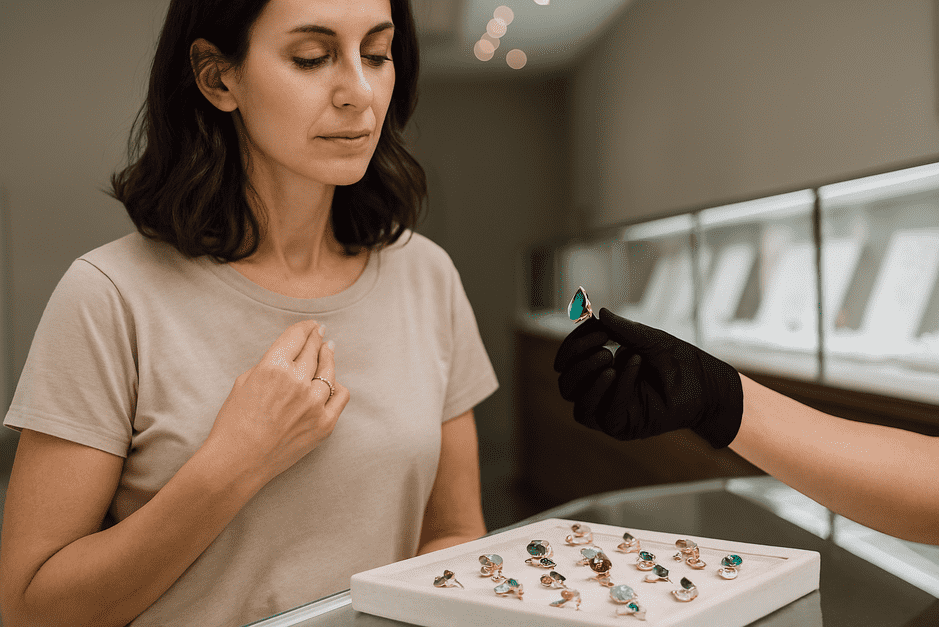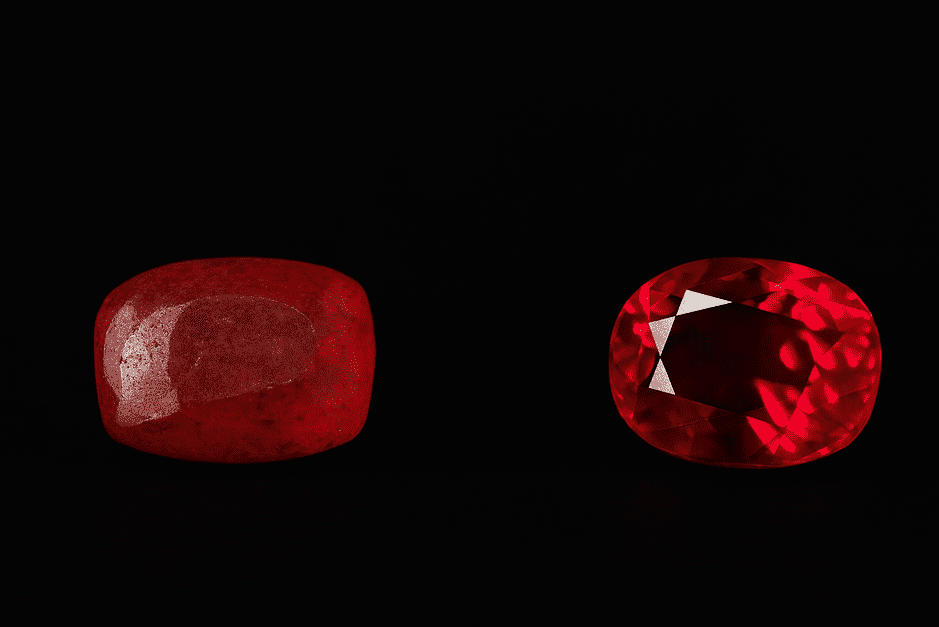Choosing a gemstone isn’t just about rarity or flawless clarity. You need the perfect gemstone for you—one that fits your style, skin tone, and lifestyle.
The key is prioritizing your personal needs over market trends.
A stone may appear flawless on paper. Yet if the color clashes with your skin tone, or the size is impractical, it becomes an accessory you’ll rarely wear. In fact, research shows nearly 60% of buyers regret gemstone purchases because they overlooked personal style or comfort. For deeper insights, see the guide on Gemstones by Color and Skin Tone.
Why the “Perfect” Stone Often Fails
- Skin Tone Mismatch: 62% of buyers select stones that look good in the store but clash with their natural skin tone. As a result, many never wear them. Learn how to avoid this mistake in Gemstone Shopping Tips.
- Lifestyle Conflicts: Large stones can be uncomfortable for daily wear. Therefore, 41% of buyers report avoiding rings they purchased due to discomfort.
- Market Trends vs Personal Taste: Rare or trending stones may look appealing. Yet, your comfort should come first, as explained in the post on Lifestyle Jewelry Choices.
Tips to Choose the Right Gemstone
- Test stones in natural light to check true color.
- Consider durability for everyday wear. For example, check ratings from the GIA Gemological Institute.
- Match size to lifestyle. Rings between 1–3 carats balance elegance and comfort. See examples in Gemstone Durability Ratings Guide.
- Factor in resale value, but above all, prioritize personal enjoyment.
- Try multiple stones before purchase. After all, handling stones yourself often reveals comfort, weight, and visual appeal.
Quote: “A gemstone is only perfect if it feels right for you.”
Q&A: Buying the Perfect Gemstone
Q: Should I buy a gemstone just because it’s rare?
A: Rare stones are tempting. Yet rarity doesn’t guarantee suitability. Therefore, choose a stone that complements your lifestyle.
Q: How do I match gemstones to my skin tone?
A: Warm skin tones suit yellow, orange, and red stones. Meanwhile, cool skin tones pair with blues, greens, and purples.
Q: How do I choose a practical size?
A: Rings between 1–3 carats are most comfortable for daily wear. For instance, many clients report higher satisfaction within this range.
Case Study:
A client chose a flawless 5-carat sapphire. However, she reported daily discomfort and eventually sold it. A 2.5-carat stone would have suited her lifestyle better. As a result, practicality proved more important than rarity.
Learn more:
. Gemological Institute of America: Gemstone grading and care
. American Gem Society: Gem buying guides and ethical sourcing
Small Luxury Hotels FAQ
Introduction
This small luxury hotels FAQ answers common questions about boutique stays. It explains definitions, differences with large chains, and which services to expect. In addition, it covers family options, sustainability, and tips on finding the right property.
What defines a small luxury hotel?
- Fewer than 100 rooms.
- Personalized attention and privacy.
- Strong links to local design.
- Locations in unique urban or rural areas.
As a result, travelers often choose them for a more intimate experience. Moreover, their distinctive style sets them apart from standardized hotels.
Why choose a small luxury hotel?
Personal service
Staff remember guest details, therefore creating a sense of familiarity.
Calm spaces
Unlike large hotels, these properties feel quieter, so you can relax more easily.
Local culture
For example, menus highlight regional produce, and interiors reflect local crafts.
In addition, many guests return because the experience feels authentic.
How do small luxury hotels differ from large chains?
Guest experience
Small hotels provide tailored attention, while chains rely on uniform systems.
Property identity
Each boutique hotel has its own theme. On the other hand, large chains repeat formats worldwide.
Dining approach
Menus change seasonally and locally. Therefore, guests enjoy fresh variety instead of standard global menus.
Are small luxury hotels only for leisure stays?
Business features
- Lounges double as meeting rooms.
- Private dining options support work dinners.
Digital needs
- Fast Wi-Fi supports remote work.
- Quiet spaces help concentration.
Because of these advantages, small luxury hotels appeal to both business and leisure travelers.
What services can you expect?
- Concierge services for tours and dining.
- Fine dining menus with seasonal ingredients.
- Spa and wellness treatments.
- Added extras like minibars and welcome gifts.
Moreover, services shift depending on location. For example, a city hotel might offer cultural tours, while a rural retreat offers farm experiences.
Are small luxury hotels family-friendly?
Options for families
- Connecting rooms for parents and children.
- Child-friendly amenities such as menus or games.
Adults-only stays
- Some properties focus on privacy.
- Guests find peaceful, child-free environments.
Therefore, always check booking policies, because each hotel sets its own approach.
Do these hotels support sustainability?
Sourcing and dining
Farm-to-table meals reduce transport impact. In addition, guests enjoy fresher produce.
Environmental focus
Plastic use is restricted, while refillable bottles are encouraged. Smart energy systems reduce wastage.
Local involvement
Hotels support the community by hiring regionally. As a result, growth extends beyond the property.
How do you find the right small luxury hotel?
Define needs
Decide if food, spa, culture, or privacy is your top priority.
Check guest feedback
For example, repeat reviews about service often signal consistency.
Compare value
Packages may include meals, transfers, or early check-in. Therefore, higher prices can still deliver stronger value.
Are small luxury hotels worth the price?
Value of service
Guests pay for attention, comfort, and privacy. Moreover, experiences feel tailored and unique.
Extras add value
Some hotels include exclusive experiences or benefits. Finally, weigh these extras against nightly rates.
As a result, many travelers feel these hotels justify their price when quality matters most.



